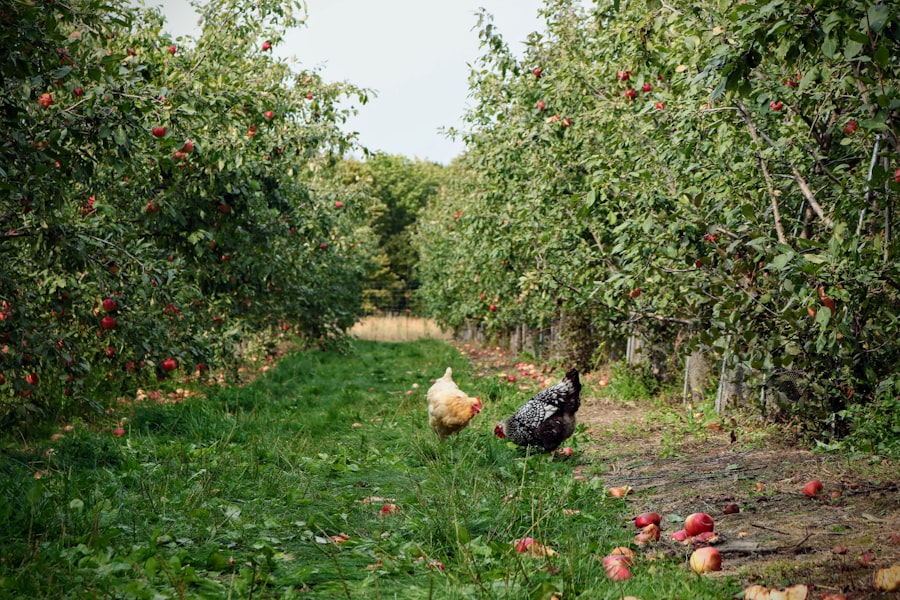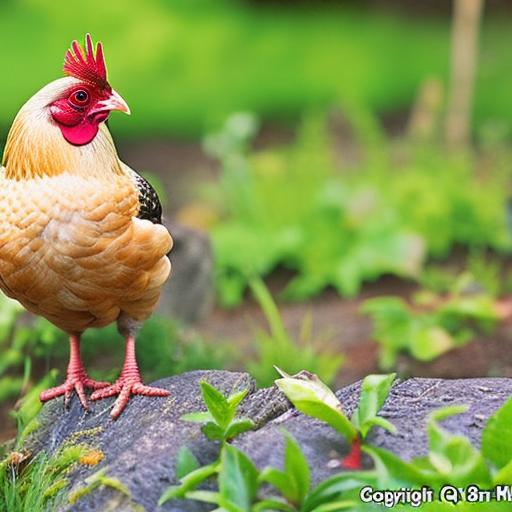Keeping chickens in your yard has become a growing trend in recent years. More and more people are realizing the benefits of raising chickens and are embracing the idea of having their own flock. Not only do chickens provide fresh eggs, but they also make great pets and can help with pest control. If you have been considering keeping chickens in your yard, this article will provide you with all the information you need to get started.
Key Takeaways
- Keeping chickens in your yard can be a rewarding and enjoyable experience.
- Raising chickens can provide benefits such as fresh eggs, pest control, and fertilizer for your garden.
- Choosing the right breed of chickens for your yard depends on factors such as climate, space, and egg production.
- Building a chicken coop requires careful planning and consideration of factors such as size, ventilation, and predator protection.
- Feeding your chickens a balanced diet and providing them with a clean and comfortable living space can help maintain their health and egg production.
Understanding the Benefits of Raising Chickens
One of the main benefits of keeping chickens in your yard is having a constant supply of fresh eggs. There is nothing quite like collecting eggs from your own backyard and knowing exactly where they came from. Fresh eggs are not only delicious, but they are also more nutritious than store-bought eggs. They contain higher levels of vitamins and omega-3 fatty acids, making them a healthier choice for you and your family.
In addition to providing fresh eggs, chickens also make great pets. They are social animals that can be quite friendly and entertaining to watch. Many people find joy in spending time with their chickens, whether it’s feeding them treats, watching them scratch around in the yard, or simply sitting and observing their behavior. Chickens can also be trained to come when called and can even learn to do tricks.
Another benefit of keeping chickens in your yard is their ability to help with pest control. Chickens are natural foragers and will eat a variety of insects, including ticks, fleas, and even small rodents. By allowing your chickens to roam freely in your yard, you can reduce the number of pests without the need for harmful chemicals or pesticides.
Choosing the Right Breed of Chickens for Your Yard
When it comes to choosing the right breed of chickens for your yard, there are several factors to consider. First, you need to think about the size of your yard and how much space you have available. Some breeds of chickens require more space than others, so it’s important to choose a breed that is suitable for your yard size.
Another factor to consider is the climate in your area. Some breeds of chickens are better suited for cold climates, while others thrive in warmer climates. It’s important to choose a breed that can withstand the weather conditions in your area to ensure the health and well-being of your chickens.
Lastly, you should consider the purpose of keeping chickens in your yard. If you are primarily interested in having fresh eggs, then you will want to choose a breed that is known for its egg-laying abilities. On the other hand, if you are more interested in having chickens as pets, then you may want to choose a breed that is known for its friendly and docile nature.
Some popular breeds for backyard chicken keeping include the Rhode Island Red, the Plymouth Rock, and the Sussex. These breeds are known for their hardiness, egg-laying abilities, and friendly personalities, making them great choices for beginners.
Building a Chicken Coop: Tips and Tricks
Having a chicken coop is essential when keeping chickens in your yard. A chicken coop provides shelter and protection for your flock, as well as a place for them to lay their eggs. When building a chicken coop, there are several factors to consider.
First, you need to think about the size of your flock and how much space they will need. Each chicken should have at least 4 square feet of space inside the coop and 10 square feet of space outside in the run. It’s important to provide enough space for your chickens to move around comfortably and engage in natural behaviors like scratching and dust bathing.
Next, you need to consider the materials you will use to build your coop. Wood is a popular choice because it is durable and provides good insulation. However, it’s important to use untreated wood to avoid exposing your chickens to harmful chemicals. You should also make sure the coop is well-ventilated to prevent the buildup of moisture and ammonia.
When designing your chicken coop, it’s important to include features that will make it easy to clean and maintain. This includes removable roosts and nesting boxes, as well as easy access to the coop for cleaning purposes. You should also consider adding windows or vents to allow for natural light and airflow.
Designing a Safe and Comfortable Living Space for Your Chickens
Designing a safe and comfortable living space for your chickens is crucial for their health and well-being. Chickens are vulnerable to predators, so it’s important to take steps to protect them. Here are some factors to consider when designing a chicken coop:
First, you need to make sure your coop is secure and predator-proof. This means using sturdy materials and reinforcing any weak spots. You should also bury hardware cloth around the perimeter of the coop to prevent predators from digging under.
Next, you need to provide adequate ventilation in the coop. Good airflow is essential for preventing the buildup of moisture and ammonia, which can lead to respiratory issues in chickens. You can achieve this by adding windows or vents that can be opened and closed as needed.
It’s also important to provide your chickens with a comfortable place to roost and lay their eggs. Chickens naturally like to roost off the ground, so you should provide sturdy roosting bars inside the coop. You should also provide nesting boxes filled with clean bedding material for your hens to lay their eggs.
Lastly, you should consider the layout of your chicken run. The run should be securely fenced to prevent your chickens from escaping and to keep out predators. It should also provide enough space for your chickens to move around freely and engage in natural behaviors like scratching and dust bathing.
Feeding Your Chickens: What to Give and What to Avoid

Feeding your chickens a balanced diet is essential for their health and egg production. Chickens are omnivores and require a mix of grains, protein, fruits, and vegetables to thrive. Here are some foods that are good for chickens:
– Layer feed: This is a specially formulated feed that is high in protein and calcium, which are essential for egg production. Layer feed can be purchased at most feed stores and should make up the majority of your chickens’ diet.
– Grains: Chickens love grains like corn, wheat, and barley. These can be fed as a treat or mixed into their regular feed.
– Fruits and vegetables: Chickens enjoy a variety of fruits and vegetables, including apples, carrots, and leafy greens. These can be fed as treats or mixed into their regular feed.
While there are many foods that are good for chickens, there are also some foods that should be avoided. These include:
– Avocado: Avocado contains a toxin called persin, which is harmful to chickens.
– Chocolate: Chocolate contains theobromine, which is toxic to chickens.
– Onions and garlic: These contain compounds that can cause anemia in chickens if fed in large quantities.
It’s important to provide your chickens with fresh water at all times. Chickens need access to clean water to stay hydrated and to help with digestion. You should also provide grit for your chickens, which helps them break down food in their gizzard.
Maintaining Chicken Health: Common Issues and Solutions
Chickens, like any other animal, can face health issues from time to time. It’s important to be aware of common health issues that chickens may experience and to know how to address them. Here are some common health issues that chickens face:
– Respiratory issues: Chickens can develop respiratory issues due to poor ventilation or exposure to ammonia. Symptoms may include coughing, sneezing, and difficulty breathing. To prevent respiratory issues, make sure your coop is well-ventilated and clean.
– Parasites: Chickens can be affected by external parasites like mites and lice, as well as internal parasites like worms. Regularly inspect your chickens for signs of parasites and treat them accordingly.
– Egg binding: Sometimes, hens may have difficulty laying eggs due to an egg being stuck in the oviduct. This can be a life-threatening condition if not addressed promptly. If you notice a hen straining or showing signs of distress, seek veterinary assistance.
To maintain the health of your chickens, it’s important to provide them with a clean and comfortable living environment. This includes regularly cleaning the coop, providing fresh water and feed, and monitoring their behavior for any signs of illness.
Collecting and Using Chicken Eggs: A Guide for Beginners
Collecting and using chicken eggs is one of the most rewarding aspects of keeping chickens in your yard. Here are some basics to keep in mind:
– Collecting eggs: Chickens typically lay their eggs in nesting boxes, so it’s important to provide clean and comfortable nesting boxes for your hens. Eggs should be collected daily to prevent them from getting dirty or broken.
– Storing eggs: Freshly laid eggs can be stored at room temperature for up to a week. If you want to store them longer, you can refrigerate them for up to a month. It’s important to store eggs with the pointed end down to help maintain their freshness.
– Using eggs: There are countless ways to use fresh eggs in your cooking. From omelets and scrambled eggs to cakes and cookies, fresh eggs can enhance the flavor and texture of your favorite recipes.
It’s important to note that not all eggs will be suitable for consumption. If an egg has a cracked shell or is dirty, it should not be eaten. It’s also important to wash eggs before using them to remove any dirt or bacteria.
Cleaning and Maintaining Your Chicken Coop: Best Practices
Cleaning and maintaining your chicken coop is essential for the health and well-being of your flock. Here are some best practices to keep in mind:
– Regularly clean the coop: The coop should be cleaned at least once a week to remove droppings and soiled bedding. This helps prevent the buildup of ammonia and reduces the risk of respiratory issues.
– Replace bedding: Bedding should be replaced regularly to keep the coop clean and odor-free. Good bedding options include straw, wood shavings, or shredded paper.
– Inspect for pests: Regularly inspect your coop for signs of pests like mites or rodents. If you notice any signs of infestation, take steps to address the issue immediately.
– Maintain good ventilation: Make sure your coop is well-ventilated to prevent the buildup of moisture and ammonia. This can be achieved by adding windows or vents that can be opened and closed as needed.
By following these best practices, you can ensure that your chickens have a clean and comfortable living environment.
Enjoying the Rewards of Keeping Chickens in Your Yard
Keeping chickens in your yard can be a rewarding experience. Not only do chickens provide fresh eggs, but they also make great pets and can help with pest control. By choosing the right breed, building a chicken coop, providing a safe and comfortable living space, feeding them a balanced diet, maintaining their health, collecting and using eggs, and cleaning and maintaining the coop, you can enjoy all the benefits that come with keeping chickens in your yard. So why not start your own backyard chicken keeping journey today?
If you’re considering keeping chickens in your yard, you’ll want to check out this informative article on creating the perfect chicken coop in Muskegon. The article, available at https://poultrywizard.com/keeping-chickens/chicken-coop-muskegon/, provides valuable insights and tips on designing a coop that meets the specific needs of your chickens while ensuring their safety and comfort. Additionally, if you’re wondering how many chickens you need for a family of four, be sure to read the article at https://poultrywizard.com/keeping-chickens/how-many-chickens-do-you-need-for-a-family-of-4/. It offers guidance on determining the ideal number of chickens to provide enough eggs for your family’s consumption. Lastly, if you’re interested in incorporating your chickens into your garden, don’t miss the article on creating a garden chicken coop at https://poultrywizard.com/keeping-chickens/garden-chicken-coop/. Discover how to integrate your feathered friends into your gardening routine while reaping the benefits of their natural pest control and fertilizer contributions.
FAQs
What are the benefits of keeping chickens in your yard?
Keeping chickens in your yard can provide you with fresh eggs, natural pest control, and fertilizer for your garden. They also make great pets and can be a fun and educational experience for children.
What do I need to consider before keeping chickens in my yard?
Before keeping chickens in your yard, you need to consider local laws and regulations, the amount of space you have available, and the time and effort required to care for them properly. You also need to ensure that your yard is secure and safe for the chickens.
What kind of housing do chickens need?
Chickens need a secure and comfortable coop to sleep in at night, as well as a run or fenced area to roam during the day. The coop should be well-ventilated, predator-proof, and have nesting boxes for the chickens to lay their eggs in.
What do chickens eat?
Chickens eat a variety of foods, including commercial chicken feed, grains, fruits, vegetables, and insects. It’s important to provide them with a balanced diet and access to clean water at all times.
How often do I need to clean the chicken coop?
You should clean the chicken coop at least once a week, removing any soiled bedding and replacing it with fresh bedding. You should also clean the nesting boxes regularly and disinfect the coop periodically to prevent the spread of disease.
What are some common health issues that chickens can face?
Chickens can face a variety of health issues, including respiratory infections, parasites, and egg-laying problems. It’s important to monitor your chickens for any signs of illness and seek veterinary care if necessary.
Can I keep roosters with my hens?
You can keep roosters with your hens, but it’s important to consider the noise they can make and the potential for aggression. Roosters are not necessary for hens to lay eggs, so it’s up to personal preference whether or not to keep them.
Meet Walter, the feathered-friend fanatic of Florida! Nestled in the sunshine state, Walter struts through life with his feathered companions, clucking his way to happiness. With a coop that’s fancier than a five-star hotel, he’s the Don Juan of the chicken world. When he’s not teaching his hens to do the cha-cha, you’ll find him in a heated debate with his prized rooster, Sir Clucks-a-Lot. Walter’s poultry passion is no yolk; he’s the sunny-side-up guy you never knew you needed in your flock of friends!







